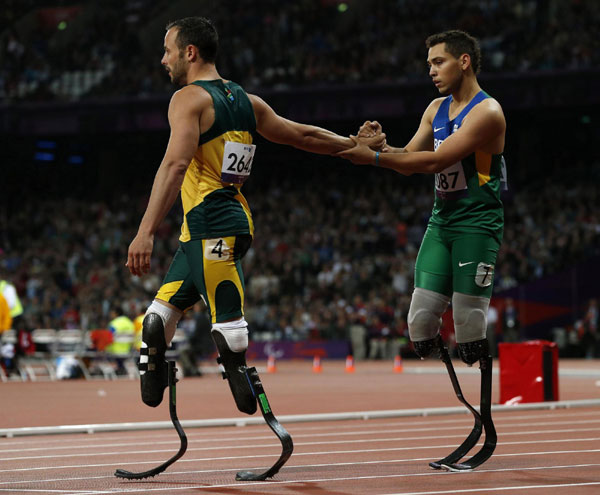Pistorius shows disabled sport can stand controversy
Updated: 2012-09-04 10:32
(Agencies)
|
||||||||
|
 |
|
Brazil's Alan Oliveira (R) is congratulated by South Africa's Oscar Pistorius after winning the Men's 200m T44 classification at the Olympic Stadium during the London 2012 Paralympic Games September 2, 2012. [Photo/Agencies] |
Elite Controversy
So can the Paralympics be credible on that basis?
"The media sometimes focus on the technology when they shouldn't," said IPC spokesman Craig Spence.
"You could say that the fact that Oscar Pistorius has attracted such media attention is a positive for Paralympic sport. The negative aspect is that the story overshadowed some terrific other performances in the stadium."
In many ways, he says, it means disabled sport is becoming mainstream as big audiences increase the pressure for transparency and fairness.
"Serious sport has big controversies ... This debate shows how seriously we want to be taken," he added.
For all its stories of personal struggles against adversity, disabled sport has never been immune to rule-bending and cheating, but has learned to adapt as mainstream sport has.
Doping is not unknown, and drug testing is systematic - although not as extensive as at the Olympics.
"Boosting" is the practice by some wheelchair-bound athletes of using self-harm to get the higher blood pressure and endurance that other athletes can achieve naturally. It is considered dangerous and banned, but is hard to test for, and has probably not been eradicated.
Athletes with intellectual impairment were shut out of the Paralympics entirely for 12 years after a Spanish basketball team faked their impairment to win gold in Atlanta.
Events are now being reintroduced slowly with tougher testing, but the complex classification of physical disabilities to allow meaningful competition regularly generates controversy.
Classification Rows
In London, US swimmer Mallory Weggemann was left fuming after having her classification changed from S7 into the less disabled S8 class on the eve of the Games. She reluctantly accepted the ruling and went on to win the S8 50m freestyle gold. Her compatriot Victoria Arlen had to appeal to be allowed to swim after being declared ineligible days before her event.
The system remains hard to grasp. But London's ecstatic spectators seem completely unperturbed by the fact that there are no fewer than 15 men's 100m finals, or that swimmers with two arms can compete against others with one arm or even none.
With 2.5 million tickets sold, the Games are a sellout.
Events have been shown in more than 100 countries. The host broadcaster Channel 4, which for the first time paid for the rights, has expanded its coverage in response to high ratings. Some 5,500 journalists and broadcasters are covering the Games.
The event has become a draw to sponsors and television advertisers. If disabled athletes are stretching the rules and the technology, it is not least because a number of them, not only Pistorius, can now earn a living from sport.
Spence says the IPC will continue to do its best to ensure a level playing field, but adds: "Athletes are getting faster because more and more of them are going full time and putting in six days a week of training.
"Oscar Pistorius has taken 2.5 seconds off his personal best in the time that he's had those blades, and that's not because of technology, that's down to hard work."

 'Taken 2' grabs movie box office crown
'Taken 2' grabs movie box office crown
 Rihanna's 'Diamonds' tops UK pop chart
Rihanna's 'Diamonds' tops UK pop chart
 Fans get look at vintage Rolling Stones
Fans get look at vintage Rolling Stones
 Celebrities attend Power of Women event
Celebrities attend Power of Women event
 Ang Lee breaks 'every rule' to make unlikely new Life of Pi film
Ang Lee breaks 'every rule' to make unlikely new Life of Pi film
 Rihanna almost thrown out of nightclub
Rihanna almost thrown out of nightclub
 'Dark Knight' wins weekend box office
'Dark Knight' wins weekend box office
 'Total Recall' stars gather in Beverly Hills
'Total Recall' stars gather in Beverly Hills
Most Viewed
Editor's Picks

|

|

|

|

|

|
Today's Top News
Health new priority for quake zone
Xi meets US top military officer
Japan's boats driven out of Diaoyu
China mulls online shopping legislation
Bird flu death toll rises to 22
Putin appoints new ambassador to China
Japanese ships blocked from Diaoyu Islands
Inspired by Guan, more Chinese pick up golf
US Weekly

|

|






